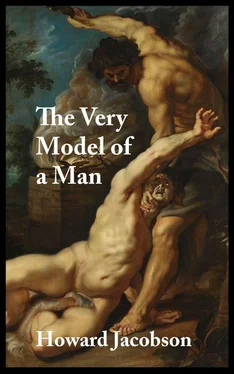There was no escaping Him, whatever the occasion. But that day… that day… with lambing going on and the whole of heaven, so it seemed, in a pastoral flutter, He was more than usually in the way. All afternoon His voice paced amongst us, hectoring, fussing, dithering and indecorous –
‘Breathe, breathe evenly. In… and now… out. In… and now… out. And… push. Push! Trust in the Lord thy God, who maketh the hind to calve, to make plentiful thy womb. Breathe and push. Breathe and push. Behold, it opens — thy womb opens!’
Until my father, my terrestrial father, could bear It no longer and pleaded with His Great Pervasiveness, His Immanence, to give us respite.
An unwatched hour or so to ourselves? Some consideration for my mother’s…?
The skin of God was thinner than an idea, His pride easier to pierce than the violet-veined eyelids of a naked new-born babe. ‘Oh yes, I forgot — your modesty.’ His wounded irony rumbled like thunder, now here, now there, now past, now still to come, then fled like a ragged shadow across the sun, and was gone.
Long after dark, though, we could still hear Him pacing the vaults of heaven, cracking His knuckles, chewing at the strands of His beard, a walking voice, predestinating, prognosticating, wretched for news. The Lord of Hosts, maker of behemoth and leviathan, already a doting grandpapa.
It was to have been, for my distraction, a naming day. A lesser christening.
The day after the day after the day after tomorrow, my father with a small f had promised, we will go and give names to the birds that swim underwater.
Fish, I said.
Not knowing what amused small boys — for I was the first small boy ever: the pattern, the progenitor of all small boys to come — he took two pebbles from the ground, blew on them (for everything still smouldered from the energy of creation), made them vanish behind his back and appear again in the sockets of his eyes, then shaped a perfect popping circle with his mouth.
Porpoise, I said, watching him pop and goggle, goby… gudgeon… turbot… ro-ro-roach… flounder… sockle — no, cockle.
He clapped his hands at every fresh invention; blew his cheeks and bulged the pebbles that were his eyes, marvelling that he in whom language lay coagulate, like the sediment in wine, could have fathered me who flowed as though I were a spring struck from rock. I was his name-boy, his nomenclator, his onomatologist, his word-child. Without me he would never have got around to distinguishing himself from a berry. He would not have laid verbal claim to a single stick or stone, would not have spoken himself apart from his own snuffling pigs. Nature would simply have closed about him. And he would not have had the words to notice.
You are so passive, my mother charged him…
You are so existentially compliant, I agreed…
You might as well be a jar, my mother said…
Or an amphora, I added, or a pitcher or an ewer or a gallipot or — there was no end to my extravagance — or a jeroboam.
His quiescence bubbled like bdellium in the sun. Laughter oozed from him and ran sizzling down his chest. Things and things may break my bones, he sang, names will never harm me. Call me what you like. A jar is good. A jerowhateveritis is even better. That’s exactly what I am — an empty earthen vessel, an Adam-amphora, a hollow-pot-man modelled out of clay.
And he would point skywards, celestial shepherdwards, with clumsy mischief, stabbing his accusing finger into his placating palm, so that the divine husbandman and potter who was always watching, insatiably lonely, illimitably lovelorn, should both see and not see.
My father lived in his hands. He could not speak the little that he spoke without them. He knew no method of concealing his guilt or protesting his innocence other than by clenching his fists or holding out his palms. Look: empty! Behold: I am a good man! He became a conjuror and juggler in an attempt to deepen his moral life. He practised legerdemain so that he might complicate his character. Lacking certainty that he could call any of his thoughts his own, he had at last to secrete small tokens of independence and self-esteem about his person. A dried pea hidden in the folds of skin between his thumb and forefinger enabled him to hold his head high.
As for not minding his origins in dust and water — God’s golem — that was just bravado. The thought that he had been assembled out of paste, on a whim, tormented him. Every night he dreamed and howled, the bristles of his beard starting from his chin as though he were more porcupine than man, his sleep distempered by the termination of his memory in mud.
Not having named emotions he was sensible of no more than he could close a hand around, and a slave to those equally. With the first light his terrors vanished — he was whole again, entire, in possession of a present so blazing it required no explanation in a past; then, either his laughter ran like resin, or his wrath overflowed like lava. I have spoken, he raged, pointing the same finger he employed for mirth. The phrase was filched unashamedly from the All Powerful One. It signified impatience at the highest level; a long rope finally running out. And promised to bring darkness down on all rebellion. Except that whereas He — HE — could punctuate it with spectacular finality, turning on the wind and showing us through a livid tunnel in the clouds His long receding back, my father lacked the machinery of conclusiveness. He could imitate the umbrage, but he had nowhere to disappear to. His rope stretched out for ever. I have spoken, he boomed, and then had to sit the silence out beneath a tree, his jaw set, his fists locked.
Look: closed! Behold: an angry man!
When the day after the day after the day after tomorrow came around and still the fish swam anonymous, I let the top off the volcano of my rage. I thought you had given me your word. I thought we had named an arrangement. I thought you had spoken.
And into the new, impressionable, still incubating earth, I stamped my foot.
Creation had not been completed in six years let alone six days. I am not saying that He whose reach is beyond measure had overreached Himself; only that the very concept of completion was erroneous. Germination had grown a scaly mind of its own. Breeding bred itself. Worts, pulses, fungi, fantastically fronded euphorbia that were part of No One’s grand design sprouted overnight on the instigation of a mere half-finger of spilt fluid. Where we stood motionless for more than a minute, vainly fancying that immobility might save us from His prying, novel vegetation came up between our toes. Bugs, beetles, horned and carapaced monstrosities inconceivable even to that Imagination, willed and bestirred themselves into being if we as much as breathed on sand. Merely to walk carelessly was to commit murder; to stamp one’s foot was to wipe out whole, untried species. But worse, it was to send an echo down we did not know how far below, and thereby waken to the idea of existence heaven itself could not guess what miscreations.
And I stamped hard enough to invent basilisks.
Fine… very good… right, my father said.
I braced myself against the coming violence. Fine… very good… right. Scornful though I was of mean words sent on grand errands, I knew the menace that lurked, pretending to be reasonable, in these. Fine, very, good and right. I had heard them often enough, and in that order, from God’s lips too, always charged with a sense of aggrieved honour, of rejected munificence, and always as a prelude to that most diabolic of all punishments — accession to a request, provision of the thing sought, in double, treble, tenfold measure. Should the sun dry up every spring and river and we complain too forcibly of thirst, He would drop a deluge on us that lasted twenty days and twenty nights. If we shivered too demonstrably beneath the naked stars He would make the moon itself scorch us with its light. Once, after the first armadillo had rattled itself upright, horrified by its birth in dung, and sent our hens and plovers scurrying in shock into a desert which the day before had been a bog and the day before that a glassy lake, we raised a query, evinced a curiosity so moderate as to be almost hypothetical — a matter of concern only to some imaginary other family in some imaginary future time. About eggs…? We did not mention that my father practised illusions with them; we kept the grounds of our concern nutritional, not conjurational. But at the same time we were careful not to sound hungry. About eggs…? We could only have said less on the subject had we said nothing. Yet the vehemence of His retort was such that not all our experience of persecution at the hands of His great givingness could have prepared us for it. A sudden change in the direction of the wind, an agitation like a cough in the foliage, warned of the imminence of the walking voice. We threw ourselves to the ground and covered our heads, hoping that It might walk over us without doing injury. But Its tread was heavy and brutal. ‘Ye have wept in the ears of the Lord,’ It rampaged, ‘saying, Who shall give us eggs that we may eat thereof? Your cries have been as the famished, even though the trees are bent double with fruit, and the air is noisy with birds. The lamb skips in the field, and the ox turns his slow head to thee. But thou criest for the shell of an egg. Fine… very good… right. Therefore shall I give eggs unto thee, and thou shalt eat, not one egg, not two eggs, neither twenty eggs nor an hundred shalt thou eat. But even an hundred times an hundred shall I give unto thee, until they come out at thy nostrils, and thou spittest them from thy face, and they are an abomination unto thee. Now shalt thou see whether or not my word shall come to pass.’
Читать дальше











